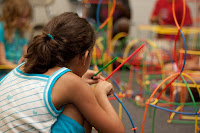There are six transdisciplinary themes, however for Early Years students the requirement is that they study four of these units per year. They are cognitively and developmentally appropriate for 3-6 year olds because they have enduring importance and learners can identify with them. The learning is deep because it will be revisited throughout the primary years, and it is relevant because you can draw on current global events. In each unit, knowledge, concepts and skills are drawn from the several of the six subject areas, but they are combined in a way that goes beyond the individual subjects. Each unit encourages students to draw on their own interests and to develop the attributes of the IB learner profile. Because of this, collaboration across the learning community is vital: everyone including the single subject teachers and the support staff, collaboratively plan for transdisciplinary learning prior to the start of each unit, during the unit and at the conclusion.
Teachers new to the PYP often think that all learning has to take place within the units of inquiry. This is not true: there needs to be a balance so that learning can take place both within and outside of the programme of inquiry. The learning environment should be set up to promote investigation and research that will build understanding. People and places are important - experts including parents can be invited in to enhance a unit, and visiting places in the community will also reinforce the inquiries.
Another thing I'm often asked about during workshops is how guided the units need to be. Of course there is no hard and fast rule for this, but in my experience Early Years students are often engaged in more guided inquiries, moving onto more student-initiated inquiries later in primary school. While units in the Early Years may be more narrow in focus, perhaps related more to the local community, later on students can begin to engage with more global challenges and opportunities, planning and designing their own learning, until in the final year of the PYP students are able to completely lead their own PYP Exhibition inquiries.
Photo Credit: Cherylt23 on Pixabay

No comments:
Post a Comment